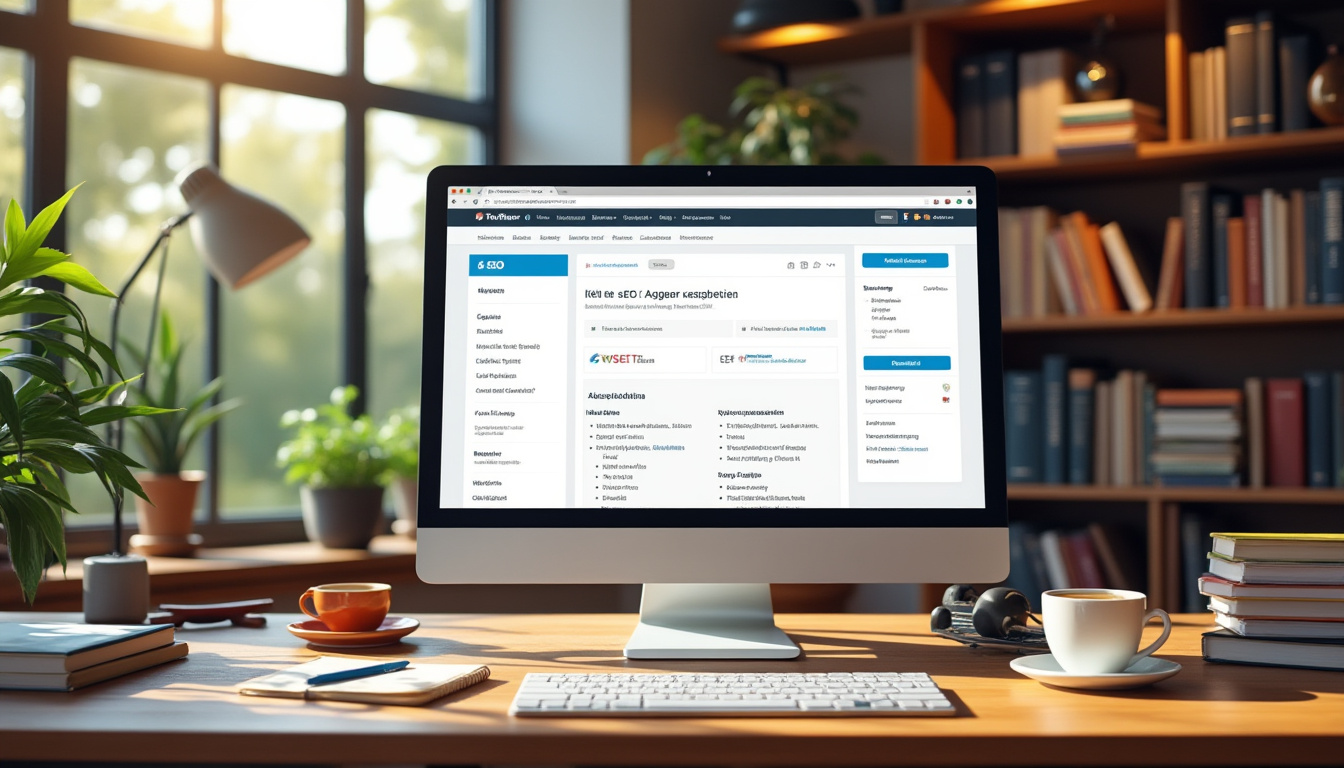This comprehensive guide dives deep into the essentials of Search Engine Optimization tailored specifically for WordPress users. It covers the fundamental concepts and techniques necessary to improve your site’s visibility in search engines. From understanding technical SEO to implementing best practices, this guide offers actionable insights to enhance your website’s performance. Learn about optimizing content, site speed, and the best SEO plugins available for WordPress to give your site a competitive edge in search results.
Search Engine Optimization (SEO) plays a pivotal role in the visibility and performance of any website, especially those built on WordPress. This comprehensive guide delves into the intricacies of optimizing a WordPress site, providing step-by-step instructions to enhance your site’s search engine ranking. From technical aspects to content strategies, this guide will equip you with the essential tools and knowledge to navigate the world of WordPress SEO effectively.
What is SEO?
SEO, or Search Engine Optimization, refers to the techniques employed to enhance a website’s visibility in search engines like Google. The ultimate goal is to drive organic traffic by improving ranking in search results for relevant queries. Understanding the key components of SEO is crucial for anyone looking to expand their online reach.
Importance of SEO for WordPress Websites
As a platform designed for ease of use, WordPress powers a significant portion of the web today. However, without proper SEO strategies, even the most beautifully designed sites may never be discovered. Effective SEO practices are essential to ensure that your site appears in front of the right audience, leading to increased traffic, higher conversion rates, and stronger brand credibility.
Technical SEO for WordPress
Understanding Technical SEO
Technical SEO involves optimizing the infrastructure of your WordPress site. This includes ensuring your site is crawlable by search engines, has a secure connection (HTTPS), and is mobile-friendly. Addressing technical SEO is the foundation upon which successful SEO strategies are built.
Site Speed Optimization
A crucial aspect of technical SEO is your site’s loading speed. Slow-loading websites frustrate users and can negatively impact your search rankings. To enhance site speed, consider optimizing images, utilizing caching solutions, and minimizing HTTP requests. For further insights, refer to this resource.
Mobile-Friendliness
With mobile devices accounting for a significant amount of web traffic, ensuring your WordPress site is responsive and mobile-friendly is essential. A mobile-optimized site enhances user experience and is favored by search engines. You can test your site’s mobile responsiveness using Google’s Mobile-Friendly Test tool.
Secure Your Website with HTTPS
Switching to HTTPS is vital for maintaining user trust and securing data exchange. Search engines prioritize secure sites, so migrating to HTTPS can improve your site’s ranking. Consider obtaining an SSL certificate through your hosting provider for enhanced security.
On-Page SEO for WordPress
Importance of On-Page SEO
On-page SEO refers to the strategies used directly on your website to improve rankings. This includes optimizing content, titles, meta descriptions, and URLs. Crafting a well-structured page with relevant keywords and engaging content is essential for achieving better search engine visibility.
Keyword Research
Keyword research is foundational for any successful SEO strategy. Identifying the right keywords allows you to create content that addresses user intent. Tools like Google Keyword Planner can aid in discovering keywords relevant to your niche.
Optimizing Titles and Meta Descriptions
Craft compelling titles and meta descriptions infused with targeted keywords. Your title should accurately reflect the content while being engaging, as it appears in search results. Ensure meta descriptions summarize your content effectively and entice users to click through.
Utilizing Headings and Subheadings
Implement proper use of heading tags (H1, H2, H3) to structure your content. The H1 tag should represent the primary topic of the page, while H2 and H3 tags help organize subtopics. Good structure enhances readability and supports SEO efforts.
Content Strategies for WordPress SEO
The Importance of Quality Content
Creating high-quality, engaging content is essential for SEO success. Search engines rank content based on its relevance and value to users. Focus on addressing user queries and providing useful information to keep visitors engaged and encourage shares.
Regularly Update Content
Keeping your content fresh and updated signals to search engines that your website is active and relevant. Regular updates encourage return visits and establish your site as a trusted source of information.
Internal and External Linking
Link building, both internally and externally, strengthens your site’s authority. Internal links connect relevant content within your website, while external links to credible sources enhance your credibility. Both types of links improve user experience and SEO performance.
Utilizing SEO Plugins for WordPress
Why Use SEO Plugins?
SEO plugins simplify the optimization process for WordPress users. These tools guide you through best practices, automate tasks, and provide analytics to monitor performance. Some popular options include Yoast SEO and All in One SEO Pack.
Setting Up an SEO Plugin
Once you’ve chosen an SEO plugin, installation is straightforward. Most plugins have intuitive setups that allow you to modify essential settings, such as titles, meta descriptions, and XML sitemaps. Customizing these settings is vital for achieving optimal results.
Tracking Performance with Analytics
Integrating analytics tools allows you to measure your site’s performance and track visitors’ behavior. Google Analytics is a highly-recommended tool for tracking data and gaining insights into how users interact with your site. For a comprehensive guide on setting up Google Analytics with WordPress, check out this resource.
Off-Page SEO Techniques for WordPress
Building Backlinks
Backlinks are links from other websites pointing to your site, and play a key role in off-page SEO. High-quality backlinks from reputable sources increase your site’s authority and improve rankings. Strategies for building backlinks include guest blogging, collaborations, and content promotions.
Social Media Engagement
Social media can amplify your content and drive traffic to your site. Engage with your audience actively and share your content across different platforms. This not only enhances visibility but can also influence search engine rankings through increased traffic and engagement.
Brand Mentions and Reputation Management
Managing your brand’s online reputation is crucial for off-page SEO. Positive brand mentions increase trustworthiness and enhance visibility. Monitor mentions across platforms and engage with users to build a positive reputation.
SEO Performance Measurement
Understanding SEO Metrics
To evaluate the effectiveness of your SEO efforts, it’s important to track specific metrics. Key performance indicators (KPIs) such as organic traffic, keyword rankings, bounce rates, and conversion rates provide valuable insights into your site’s performance.
Using Google Search Console
Google Search Console is a powerful free tool that allows you to monitor your site’s presence in Google search results. It provides insights into indexing status, search queries, and site issues. Regularly checking your Search Console can help you identify areas that need improvement.
WordPress SEO Checklist for 2024
Having a checklist can help ensure that all aspects of your WordPress site are optimized. Start with the following key areas:
- Conduct thorough keyword research.
- Optimize site speed and mobile-friendliness.
- Implement a strong internal and external linking strategy.
- Utilize a recommended SEO plugin.
- Regularly update and create high-quality content.
- Track your performance metrics using tools like Google Analytics and Search Console.
Understanding and implementing effective SEO strategies is essential for the success of a WordPress site. From technical setup to content creation and link building, every step plays a crucial role in enhancing search visibility. By following the guidelines and practices outlined in this comprehensive guide, you can significantly improve your website’s performance in search engine results, steering your site towards greater online success.

Search Engine Optimization (SEO) is crucial for anyone looking to enhance the visibility of their WordPress website. This comprehensive guide will delve into the fundamental aspects of SEO tailored specifically for WordPress users, uncovering the techniques that can elevate your site in search engine rankings. You will learn about essential practices, recommended plugins, and strategies for technical optimization.
What is SEO?
SEO stands for Search Engine Optimization. It encompasses strategies and techniques aimed at improving a website’s visibility in search engine results pages (SERPs). The proper implementation of SEO ensures that your site can reach a broader audience.
Importance of SEO for WordPress
Understanding the significance of SEO for WordPress is vital. With millions of websites operating on this platform, optimizing your site can provide a competitive edge. By following best SEO practices, you can increase organic traffic, improve user experience, and build brand authority.
Basic SEO Practices for WordPress
Implementing basic SEO practices is the first step toward enhancing your WordPress site’s visibility. Key strategies include:
Use of Keywords
Incorporating relevant keywords throughout your content helps search engines understand the context of your posts. Perform keyword research to find terms your audience is searching for and integrate them naturally into your titles, headings, and body text.
Optimizing URLs
WordPress automatically generates URLs, but you should customize them to include keywords and eliminate unnecessary words. Short, descriptive URLs improve both SEO and user experience.
Title and Meta Descriptions
Ensure every post has a unique title and meta description containing your main keywords. These elements not only influence search rankings but also impact the click-through rate when users see your site on the SERP.
Technical SEO for WordPress
Delving into technical SEO is crucial for optimal site performance. Important considerations include:
Website Speed
A fast-loading website significantly improves SEO ranking and user experience. Implement techniques to enhance speed, such as using caching plugins, optimizing images, and selecting a reliable hosting provider. You can learn more about improving site speed here.
Mobile Responsiveness
As mobile browsing becomes increasingly common, ensuring your WordPress site is mobile-friendly is paramount. Use responsive themes and test your site’s functionality on various devices to guarantee seamless user experience.
Integrating Google Analytics
Tracking your SEO performance is essential. Integrating Google Analytics into your WordPress site allows you to monitor visitor behavior, traffic sources, and other vital metrics. For effective integration, refer to this guide.
Utilizing SEO Plugins
WordPress offers numerous SEO plugins designed to simplify the optimization process. Choosing the right plugins can automate certain tasks, allowing you to focus on creating great content. Popular plugins include:
Yoast SEO
This highly regarded plugin helps users optimize their content for specific keywords and readability. It provides actionable suggestions and ensures that key components of your posts are adequately addressed.
AIOSEO
All in One SEO Pack (AIOSEO) is another powerful tool that offers a user-friendly experience while supporting advanced features. For a comprehensive understanding of AIOSEO, you can check the ultimate guide.
Best Practices for Content Creation
Creating high-quality content is a cornerstone of successful WordPress SEO. Focus on producing valuable, engaging, and informative content that addresses your target audience’s needs.
Regular Updates
Keep your content fresh by updating old posts and adding new ones regularly. Search engines favor sites that provide consistent and updated information.
Internal and External Linking
Incorporate internal links to guide readers to related content and improve site navigation. Additionally, including credible external links can improve your site’s authority.
By adopting these strategies and utilizing the right tools, you can effectively enhance your WordPress site’s SEO performance. Explore more about improving your website’s speed here, and stay updated with the latest practices to ensure sustained growth in your online visibility.
SEO Techniques for WordPress
| SEO Technique | Description |
| Keyword Research | Identifying relevant keywords that your target audience is searching for. |
| On-Page SEO | Optimizing individual pages to rank higher, including meta tags and content quality. |
| Technical SEO | Ensuring your website’s backend is optimized for search engines, such as improving site speed. |
| Content Quality | Creating valuable, informative, and engaging content that satisfies user queries. |
| Backlinking | Acquiring links from reputable sites to boost your site’s authority and trustworthiness. |
| User Experience | Enhancing navigation and site structure to provide a better experience for visitors. |
| Mobile Optimization | Ensuring your site is responsive and performs well on mobile devices. |
| SEO Plugins | Utilizing tools like Yoast or Rank Math to simplify SEO management on your site. |
Search Engine Optimization (SEO) is crucial for enhancing the visibility of your WordPress site in search engine results. This comprehensive guide dives into the fundamental strategies and techniques to optimize your WordPress website, ensuring you rank higher and attract a substantial audience.
What is SEO and Why is it Important?
SEO, or Search Engine Optimization, refers to the set of practices aimed at improving the ranking of a website on search engine results pages (SERPs). Understanding SEO for your WordPress site is vital, as it allows your content to be discoverable by users searching for relevant topics. Implementing effective SEO strategies can significantly impact your website’s traffic and overall visibility.
The Basics of WordPress SEO
When starting with WordPress SEO, it is essential to familiarize yourself with some fundamental principles. One critical aspect is understanding how search engines crawl and index your website. This involves the use of web crawlers that analyze your content for relevance and quality based on keywords, metadata, and site structure.
Having a clear site structure with logically organized content helps search engines understand your site better. Utilize categories and tags effectively to enhance your site’s navigability and improve user experience.
Technical SEO for WordPress
Technical SEO encompasses various backend website optimizations. Ensuring your WordPress site is mobile-friendly is vital as more users access the web through mobile devices. Additionally, page speed is a key factor that influences SEO rankings; websites that load quickly offer a better user experience, leading to lower bounce rates.
Permalinks and URL Structure
Another critical aspect of technical SEO is the use of appropriate permalinks. WordPress allows you to configure URL structures, making them user-friendly and keyword-rich. A URL that describes your content not only benefits SEO but also builds trust among your users.
Content Optimization
Creating quality content is at the heart of effective SEO. Ensure that your content is unique, informative, and relevant to your audience. Utilizing keywords strategically throughout your posts can help search engines identify your content’s focus, improving its ranking potential.
Using SEO Plugins
WordPress offers numerous SEO plugins that simplify the optimization process. Popular options such as Yoast SEO and All in One SEO Pack provide tools for on-page SEO analysis, helping you fine-tune your posts to meet best practice guidelines.
Link Building Strategies
Link building is an integral component of SEO. Gaining backlinks from reputable sites can elevate your site’s authority in the eyes of search engines. Focus on creating valuable content that others will want to link to, and consider outreach strategies to connect with influencers in your niche.
Internal Linking
Don’t overlook the importance of internal linking. Creating connections between your own posts helps distribute page authority, guides visitors to other relevant content, and keeps users engaged with your site longer.
Monitoring and Analytics
To gauge the success of your SEO efforts, regularly monitor key metrics. Utilizing tools like Google Analytics can provide insights into user behavior, helping identify which SEO strategies are working and which need adjustment. Paying attention to these analytics allows for data-driven decisions that enhance your SEO approach.
Ongoing Education and Adaptation
SEO is an evolving field, with search engine algorithms frequently updating. Staying informed about the latest trends and adjustments in SEO practices ensures that your WordPress site remains competitive and relevant. Embrace a culture of continuous learning to adapt to the ever-changing landscape of search engine optimization.









